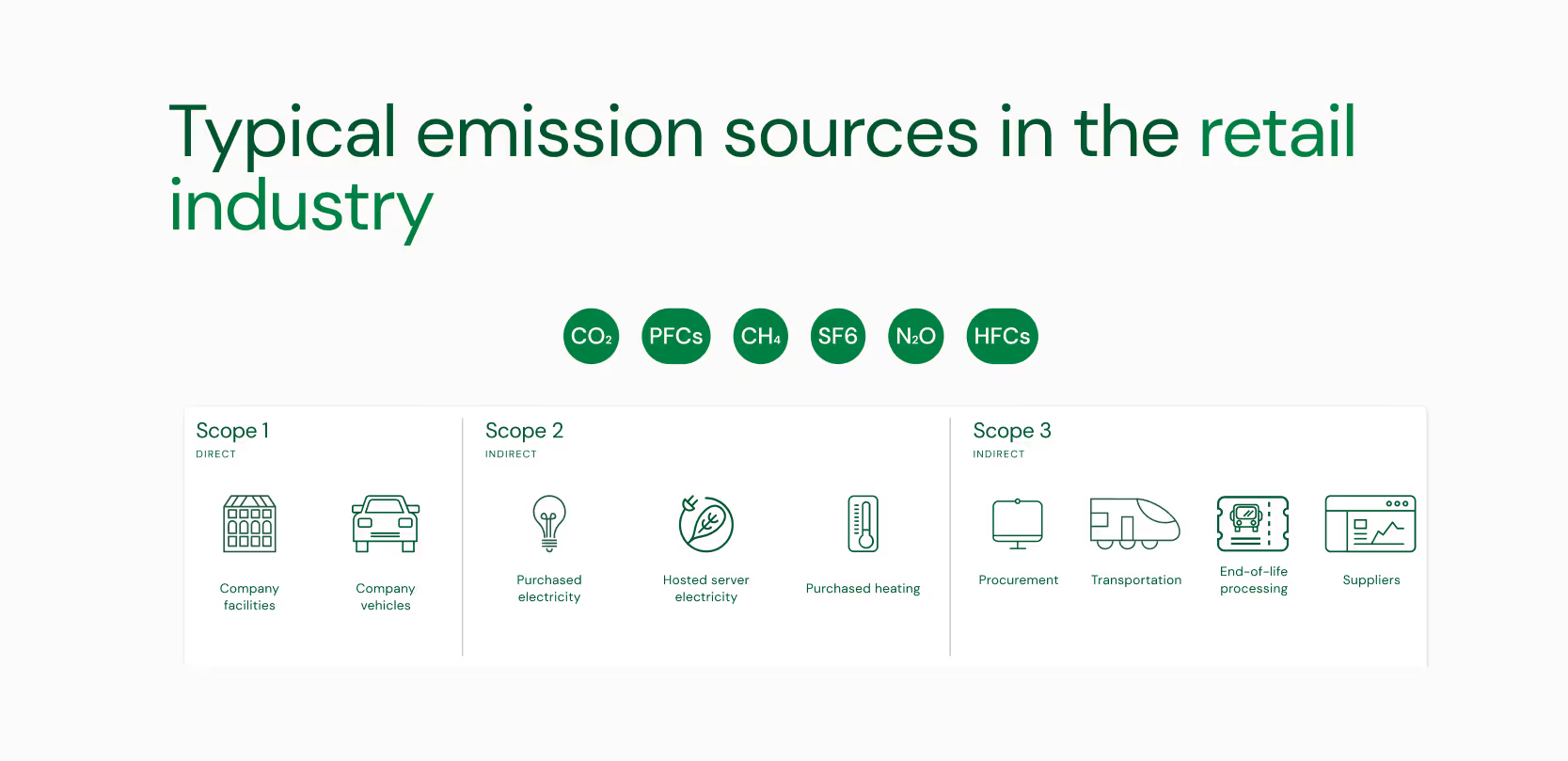The retail industry, with its vast global footprint, plays a crucial role in the global economy and the environmental ecosystem. In 2022, the global retail market generated an impressive $27 trillion in sales, a figure projected to exceed $30 trillion by 2024. However, this economic success comes at a significant environmental cost. The retail sector is one of the top 10 most carbon-intensive industries, responsible for roughly 25% of global greenhouse gas (GHGs). The majority of these emissions arise from the extensive retail value chain, which accounts for up to 98% of a retailer's total emissions.
Despite its negative environmental impact, the retail sector is uniquely positioned to lead transformational change. With the capacity for significant influence, retail companies undergoing sustainable transformations can meet increasing regulatory requirements, shift stakeholder values, and achieve emissions reduction targets. The adoption of carbon accounting and decarbonisation software by leaders underscores a move towards effective decarbonisation in the industry. Thus, retail's broad reach offers unparalleled potential to drive societal shifts in consumption patterns, enforce environmentally oriented policies, and promote sustainable building practices.
This strategic position, reinforced by international regulations such as the Paris Agreement and the Corporate Sustainability Reporting Directive (CSRD), underscores the critical role of retail in reducing energy consumption and GHG emissions. The retail sector's concentrated nature facilitates the dissemination of best practices, emphasising a comprehensive approach to Corporate Social Responsibility (CSR) and sustainability-driven management to mitigate its environmental impact.
Tackling Scope 3 emissions: The retail industry's decarbonisation challenge
The retail industry's contribution to global GHGs, particularly through Scope 3 emissions, highlights a critical area for intervention. These emissions, not directly controlled by retailers but associated with their value chain—including the procurement of goods, transportation, distribution, and the end-of-life processing of products—represent a significant portion of the sector's environmental impact. For many companies, especially in the home and fashion segments, Scope 3 emissions can constitute up to 98% of their carbon footprint.

Credit: Plan A
To address these challenges, retailers are exploring various strategies to reduce both direct and indirect emissions. Initiatives include enhancing the energy efficiency of stores through the adoption of LEDs and more efficient HVAC systems and deploying zero-emissions vehicles to mitigate their impact on global warming. Grocers, facing specific challenges with refrigeration, are also innovating to manage refrigerant leaks and overhaul systems for better efficiency. These efforts not only aim at reducing Scope 1 and 2 emissions but also at tackling the more complex Scope 3 emissions by engaging suppliers in the decarbonisation journey.
However, the challenge extends into the wider value chain. Retailers increasingly hold their suppliers accountable for reducing emissions by adopting greener manufacturing processes, using sustainable materials, and ensuring products are designed for energy efficiency. Global initiatives like IKEA's ambition for zero-carbon container shipping by 2040 exemplify the sector's commitment to decarbonisation, emphasising the potential for significant industry-wide impacts through innovative solutions like "power-to-x" for green liquid fuel production.
The regulatory landscape is rapidly evolving, with directives like the Corporate Sustainability Reporting Directive (CSRD) mandating comprehensive tracking, measurement, and reporting of environmental impacts. Failure to comply not only risks significant financial penalties, averaging $2 million for non-compliance with sustainability and ESG standards but also jeopardises a retailer's reputation and market position.
Increasingly, consumers, especially Gen Z and Millennials, are prioritising sustainability, and willing to pay premiums for sustainable products. This shift is evidenced by a growing trend of consumers verifying sustainability claims and abandoning brands that fail to demonstrate environmental responsibility.
In the current market, consumer behavior, particularly among Gen Z and Millennials, is increasingly driven by sustainability values. These consumers are willing to pay higher prices for products that are environmentally responsible, a trend supported by their active efforts to validate the sustainability claims of brands. On the financial side, retail businesses are navigating a complex landscape where decarbonisation efforts might lead to an increase in operational costs. However, the readiness of consumers to pay a premium for sustainable products presents an opportunity for businesses to offset these costs, making sustainability a profitable strategy.
In sum, the urgency for change in the retail sector is driven by a confluence of factors, including the imperative to reduce Scope 3 emissions, navigate tightening regulations, and respond to shifting consumer preferences. Retailers must adopt comprehensive sustainability strategies that address these challenges head-on, ensuring their operations contribute positively to the triple bottom line while securing their competitive advantage in an increasingly eco-conscious market.
Unlocking growth: The strategic edge of sustainability in retail
The retail industry stands at a crossroads where sustainability is no longer optional but a critical differentiator in the market. Studies indicate that 89% of institutional investors now incorporate ESG data into their decision-making, showcasing the financial viability of sustainability initiatives. These programs have been shown to increase shareholder value by $1.28 billion over 15 years, highlighting the significant return on investment that sustainable practices can yield.
Furthermore, embracing sustainability can lead to considerable cost savings for retail businesses. With research pointing to a potential 60% improvement in operating profits through resource cost reductions, the financial incentives are clear. Lower energy bills reduced fossil fuel consumption, and supply chain optimisation are just a few areas where retailers can realise savings. Transitioning to sustainable and circular practices not only benefits the bottom line but also positions companies to lead in sustainability.
Vendor and supplier engagement is also pivotal in this journey. As transparency around carbon emissions increases, procurement criteria are evolving to favour responsible practices. This shift has led some major retailers, like Nike, to make bold sustainability commitments, including a 70% reduction in GHG emissions in owned facilities and pushing for renewable energy use among key suppliers. These efforts demonstrate the collaborative potential in the retail value chain to address Scope 3 emissions effectively.
Retailers that navigate these dynamics successfully can not only enhance their competitive advantage but also contribute meaningfully to environmental sustainability. This comprehensive approach to sustainability illustrates a future where retail thrives economically and leads as a steward of environmental responsibility.
Top decarbonisation strategies for the retail industry
The journey towards decarbonisation involves a multi-faceted approach, incorporating transparency, technological innovation, and strategic partnerships. By prioritising these areas, retailers can embark on a path that not only mitigates their environmental impact but also positions them as leaders in sustainability. Drawing on recent findings, this section outlines effective strategies that retail businesses can implement or adapt to reduce their carbon footprint.
Setting ambitious energy targets
A fundamental strategy involves committing to aggressive goals for enhancing energy efficiency and incorporating renewable energy sources. Retailers must invest in innovative technologies and practices that reduce energy consumption across their operations, from stores to distribution centres. Also investing in carbon accounting software like Plan A is essential for measuring, reducing, and reporting emissions accurately.
Enhancing supply chain sustainability
The sustainability of the supply chain is another critical area of focus. Retailers can make significant emissions reductions by optimising logistics, investing in sustainable materials, and collaborating with suppliers who prioritise carbon footprint reduction. This not only reduces overall emissions but also encourages a shift towards a more sustainable retail ecosystem.
Product-level emissions transparency
Tracking emissions at the product or subcategory level enables retailers and customers to make informed decisions. For instance, Carrefour's investment in blockchain for product lifecycle tracing exemplifies how technology can facilitate sustainable choices.
Adopting sustainable retail operations
Implementing green practices in retail operations, such as using sustainable building materials, energy-efficient lighting, and heating, ventilation, and air conditioning (HVAC) systems, plays a crucial role in decarbonisation. Retailers should design and manage their physical spaces with sustainability in mind, from construction to end-of-life, ensuring that operations are as efficient as possible.
Incorporating decarbonisation in procurement
Embedding emissions criteria into sourcing processes allows for the identification of cost increases related to decarbonisation, ensuring negotiations with suppliers are grounded in the realities of transitioning to greener materials and processes.
Engaging investors and public sector partnerships
Dialogue with key investors on decarbonisation strategies can unlock support and funding, such as green bonds. Participation in public-sector decarbonisation efforts ensures retailers influence policy development and access to transition funding.
Industry-wide collaborations
Creating and leading partnerships within the industry to standardise the use of green materials and encourage collective action towards supply chain decarbonisation can accelerate the transition to a low-carbon economy.
Through the adoption of these strategies, retailers must continuously seek areas for improvement, from procurement to customer engagement. Building emissions criteria into sourcing processes and engaging in industry-wide efforts to standardise decarbonisation practices will ensure a unified approach. Collaborating with government agencies, industry associations, and suppliers will enable retailers to share expertise, leverage financial incentives, and drive collective action towards a sustainable future.
Charting the sustainable future of retail
The retail industry stands at the forefront of the global fight against climate change. By embracing sustainable practices and prioritising decarbonisation, retailers can not only mitigate their environmental impact but also unlock new avenues for growth and innovation. The journey towards sustainability is complex, requiring commitment, innovation, and collaboration. However, the benefits of this transformation extend far beyond compliance and risk mitigation, they offer a path to a more sustainable, equitable, and profitable future for the retail sector.
Transform your retail business towards sustainability with Plan A, book your demo today and lead the change.




.jpg)


.webp)
